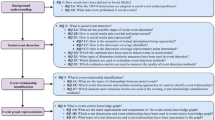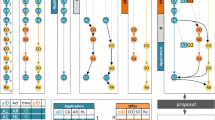Abstract
The publicly available data, such as the massive and dynamically updated news and social media data streams (a.k.a. big data), cover a wide range of social activities, personal views, and expressions. Effective research and application rely heavily on the ability of comprehending and discovering the knowledgepatterns underlying this big data, from which the notion of an event serves as a cornerstone in building up more complex knowledge structures. Establishing methodologies and techniques for discovering real-world events from such large amounts of data, as well as for managing and analyzing such events in an efficient and aesthetic manner, is crucial and challenging. In this paper, we present an event cube framework devised to support various collection, consolidation, fusion, and analysis tasks for suicidal events. More specifically, we present a mechanism for data collection over multiple data sources in both passive and active manners, and promote the mappings constructed from various representation spaces for data consolidation. Furthermore, multimodal fusion is devised to integrate multiple data intrinsic structures and learn discriminative data representations so as to process heterogeneous multimodal data efficiently. Finally, the event cube model is developed to support event organization and contextualization with hierarchical and analytical operations. A case study is provided to demonstrate the capabilities and benefits of our event cube facilities supporting on-line analytical processing of suicidal events and their relationships.
Access this chapter
Tax calculation will be finalised at checkout
Purchases are for personal use only
Similar content being viewed by others
References
Kumaran, G., Allan, J.: Text classification and named entities for new event detection. In: Proceedings of the 27th Annual International ACM SIGIR Conference on Research and Development in Information Retrieval, July 2004, pp. 297–304 (2004)
Sakaki, T., Okazaki, M., Matsuo, Y.: Earthquake shakes Twitter users: real-time event detection by social sensors. In: Proceedings of the 19th International Conference on World Wide Web, April 2010, pp. 851–860. ACM (2010)
Sawhney, R., Joshi, H., Gandhi, S., Shah, R.: A time-aware transformer based model for suicide ideation detection on Social Media. In: Proceedings of the 2020 Conference on Empirical Methods in Natural Language Processing (EMNLP), November 2020, pp. 7685–7697 (2020)
Nguyen, T., Grishman, R.: Graph convolutional networks with argument-aware pooling for event detection. In: Proceedings of the AAAI Conference on Artificial Intelligence, April 2018, vol. 32, no. 1 (2018)
Weng, J., Lee, B.S.: Event detection in twitter. In: Proceedings of the International AAAI Conference on Web and Social Media, July 2011, vol. 5, no. 1 (2011)
Feng, W., et al.: STREAMCUBE: hierarchical spatio-temporal hashtag clustering for event exploration over the Twitter stream. In: 2015 IEEE 31st International Conference on Data Engineering, April 2015, pp. 1561–1572. IEEE (2015)
Yang, C.C., Shi, X., Wei, C.-P.: Tracing the event evolution of terror attacks from on-line news. In: Mehrotra, S., Zeng, D.D., Chen, H., Thuraisingham, B., Wang, F.-Y. (eds.) Intelligence and Security Informatics, pp. 343–354. Springer, eidelberg (2006). https://doi.org/10.1007/11760146_30
Deng, L., Xu, B., Zhang, L., Han, Y., Zou, P.: Event evolution analysis in microblogging based on a view of public opinion field. In: 2013 Sixth International Symposium on Computational Intelligence and Design, October 2013, vol. 2, pp. 193–197. IEEE (2013)
Huang, D., Hu, S., Cai, Y., Min, H.: Discovering event evolution graphs based on news articles relationships. In: 2014 IEEE 11th International Conference on e-Business Engineering, November 2014, pp. 246–251. IEEE (2014)
Zhou, P., Wu, B., Cao, Z.: Emmbtt: a novel event evolution model based on TFxIEF and TDC in tracking news streams. In: 2017 IEEE Second International Conference on Data Science in Cyberspace (DSC), June 2017, pp. 102–107. IEEE (2017)
Gray, J., et al.: Data cube: a relational aggregation operator generalizing group-by, cross-tab, and sub-totals. Data Min. Knowl. Disc. 1(1), 29–53 (1997)
Li, C., Ooi, B.C., Tung, A.K., Wang, S.: Dada: a data cube for dominant relationship analysis. In: Proceedings of the 2006 ACM SIGMOD International Conference on Management of Data, June 2006, pp. 659–670 (2006)
Li, Q., Ma, Y., Yang, Z.: Event cube – a conceptual framework for event modeling and analysis. In: Bouguettaya, A., et al. (eds.) Web Information Systems Engineering – WISE 2017: 18th International Conference, Puschino, Russia, October 7-11, 2017, Proceedings, Part I, pp. 499–515. Springer International Publishing, Cham (2017). https://doi.org/10.1007/978-3-319-68783-4_34
Wong, J.C.Y., Wang, J., Fu, E.Y., Leong, H.V., Ngai, G.: Activity recognition and stress detection via Wristband. In: Proceedings of the 17th International Conference on Advances in Mobile Computing & Multimedia, December 2019, pp. 102–106 (2019)
Fu, E.Y., Wong, C.Y., Lau, K.T., Leong, H.V., Ngai, G.: Your body signals expose your fall. In: Proceedings of the 21st International Conference on Information Integration and Web-Based Applications & Services, December 2019, pp. 689–693 (2019)
Xin, H., Lin, X., Chen, L.: CaSIE: canonicalize and informative selection of the OpenIE. In: Proceedings of ICDE 2021 (To appear) (2021)
Li, J., Di, S., She, Y., Chen, L.: FluxEV: a fast and effective unsupervised framework for time-series anomaly detection, WSDM 2021 (To appear) (2021)
Jian, X., Wang, Y., Chen, L.: Effective and efficient relational community detection and search in large dynamic heterogeneous information networks. Proc. VLDB Endowm. 13(10), 1723–1736 (2020)
Yao, X., Shao, Y., Cui, B., Chen, L.: UniNet: scalable network representation learning with metropolis-hastings sampling. In: Proceedings of ICDE (2020)
Zhang, Y., Yao, Q., Chen, L.: Interstellar: searching recurrent architecture for knowledge graph embedding. In: Proceedings of NeurIPS 2020 (2020)
Wang, Y., et al.: Disk: a distributed framework for single-source simrank with accuracy guarantee. Proc. VLDB Endowm. 14(3), 351–363 (2020)
Di, S., Yao, Q., Zhang, Y., Chen, L.: Efficient relation-aware scoring function search for knowledge graph embedding. ICDE 2021 (To appear) (2021)
Zeng, Y., Tong, Y., Chen, L.: HST+: an efficient index for embedding arbitrary metric spaces. In: Proceedings of ICDE 2021 (2021)
Liu, Q., Zheng, L., Shen, Y., Chen, L.: Stable learned bloom filters for data streams. Proc. VLDB Endowm. 13(12), 2355–2367 (2020)
Li, Y., Shen, Y., Chen, L.: Palette: towards multi-source model selection and ensemble for reuse. In: Proceedings of ICDE 2021 (To appear) (2021)
Yang, Z., Li, Q., Xie, H., Wang, Q., Liu, W.: Learning representation from multiple media domains for enhanced event discovery. Pattern Recogn. 110, 107640 (2021)
Yang, Z., Lin, Z., Kang, P., Lv, J., Li, Q., Liu, W.: Learning shared semantic space with correlation alignment for cross-modal event retrieval. ACM Trans. Multim. Comput. Commun. Appl. 16(1), 1–22 (2020)
Yang, Z., Lin, Z., Guo, L., Li, Q., Liu, W.: MMED: a multi-domain and multi-modality event dataset. Inf. Process. Manag. 57(6), 102315 (2020)
Chen, X., Li, Q., Wang, J.: A unified sequence labeling model for emotion cause pair extraction. In: Proceedings of the 28th International Conference on Computational Linguistics, December 2020, pp. 208–218 (2020)
Chen, X., Li, Q., Wang, J.: Conditional causal relationships between emotions and causes in texts. In: Proceedings of the 2020 Conference on Empirical Methods in Natural Language Processing (EMNLP), November 2020, pp. 3111–3121 (2020)
Acknowledgements
We are greatly indebted to Dr. Xingyun Liu for her valuable comments and insightful suggestions to our event cube prototype and suicidal analysis. The research described in this paper has been supported by the Hong Kong Research Grants Council through a Collaborative Research Fund (project no. C1031-18G) and Shenzhen Philosophy and Social Sciences Fund in the 13th Five-year Plan (project no. SZ2018B020), P. R. China.
Author information
Authors and Affiliations
Editor information
Editors and Affiliations
Rights and permissions
Copyright information
© 2021 Springer Nature Switzerland AG
About this paper
Cite this paper
Li, Q. et al. (2021). Event Cube for Suicidal Event Analysis: A Case Study. In: Zhang, W., Zou, L., Maamar, Z., Chen, L. (eds) Web Information Systems Engineering – WISE 2021. WISE 2021. Lecture Notes in Computer Science(), vol 13080. Springer, Cham. https://doi.org/10.1007/978-3-030-90888-1_39
Download citation
DOI: https://doi.org/10.1007/978-3-030-90888-1_39
Published:
Publisher Name: Springer, Cham
Print ISBN: 978-3-030-90887-4
Online ISBN: 978-3-030-90888-1
eBook Packages: Computer ScienceComputer Science (R0)




